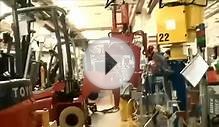
Production system any of the methods used in industry to create goods and services from various resources.
Underlying principles
All production systems, when viewed at the most abstract level, might be said to be “transformation processes”—processes that transform resources into useful goods and services. The transformation process typically uses common resources such as labour, capital (for machinery and equipment, materials, etc.), and space (land, buildings, etc.) to effect a change. Economists call these resources the “factors of production” and usually refer to them as labour, capital, and land. Production managers refer to them as the “five M’s”: men, machines, methods, materials, and money.
When viewed as a process, a production system may be further characterized by flows (channels of movement) in the process: both the physical flow of materials, work in the intermediate stages of manufacture (work in process), and finished goods; and the flow of information and the inevitable paperwork that carry and accompany the physical flow. The physical flows are subject to the constraints of the capacity of the production system, which also limits the system’s ability to meet output expectations. Similarly, the capacity of the information-handling channel of the production system may also be an important measure of a system’s output. The management of information flows, or the planning and control of the system to achieve acceptable outputs, is an important task of the production manager.
While the capacity of the system is the major factor in determining whether output expectations can be met, the additional consideration of quality must also be seen as a limiting factor. The quality of a product, measured against some objective standard, includes appearance, performance characteristics, durability, serviceability, and other physical characteristics; timeliness of delivery; cost; appropriateness of documentation and supporting materials; and so on. It is an important part of the definition of a system.
Types of production systems
There are three common types of basic production systems: the batch system, the continuous system, and the project system. In the batch system, general-purpose equipment and methods are used to produce small quantities of output (goods or services) with specifications that vary greatly from one batch to the next. A given quantity of a product is moved as a batch through one or more steps, and the total volume emerges simultaneously at the end of the production cycle. Examples include systems for producing specialized machine tools or heavy-duty construction equipment, specialty chemicals, and processed food products, or, in the service sector, the system for processing claims in a large insurance company. Batch production systems are often referred to as job shops.
RELATED VIDEO












